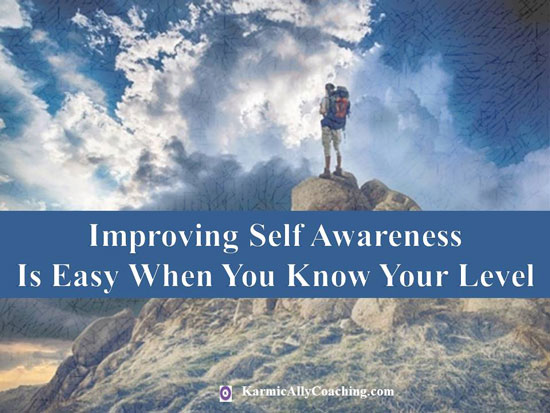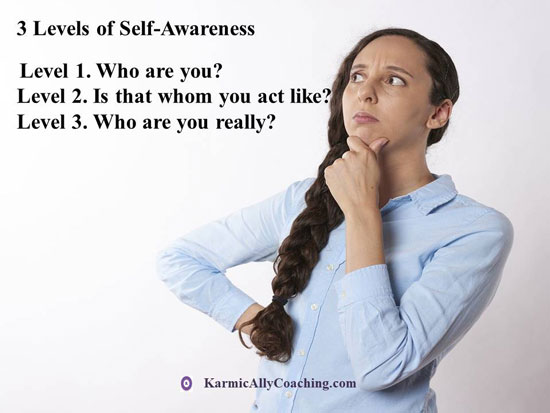This post has already been read 224 times!

In an earlier post, I shared 5 common signs indicating the need to improve self-awareness as well as ways to do it.
That guidance if applied consistently will definitely raise your self-awareness and emotional intelligence level.
The question is what’s your level of self-awareness?
Yes, there are levels of self-awareness. It’s not that complicated although you’ll find people differing on how many levels.
The 3 Levels of Self-Awareness
The number of levels isn’t as important as being able to demonstrate the skill. So, I’m sticking to just 3 levels.

For a truly self-aware person all 3 levels listed above should add up most of the time. Yet, there are times when we need to find a balance. That’s where difficulties will arise.
For example, at level 1, you believe in being honest. Your motto is to always tell the truth no matter the place or situation. You justify it with sayings like truth can be a bitter pill to swallow.
Being truthful and honest in voicing your views is a good thing but sometimes, it can project you as being harsh, rude or even critical.
There is a time, place, and way to share the truth. Radical honesty is just no filter and an excuse to be unkind to others. In this case – your level 2 does not align with level 1. So, who are you really?
Think about this for a moment. Are you the same person at home with your family as you are with your friends? Does your frame of mind alter how you respond to situations?
Do you change your body language and your tone to cater to specific audiences? Probably. Should you? Probably not.
There may be times to do this, but for the most part, you should be self-aware enough to be authentic.
Level 1 – Who are you?
Everything starts with you and your self-perception. Be truthful with yourself. What kind of person do you believe yourself to be?
Are you socially aware? Are you considerate? Do you consider yourself to be a thoughtful conversationalist?
Perhaps you are fully aware of the fact that you have a short fuse?
Or maybe you are well-mannered until you reach a certain point. Are you supportive in your relationships?
When someone asks you your strengths, there’s a good chance you can come up with a few.
What about your weaknesses?
What about your motivations?
Do you know what motivates you, what you desire? Do you have a strong understanding of your beliefs and how you perceive the world?
Think about what kind of person you believe yourself to be and prepare to be brutally honest in the next level.
Level 2 – Is that whom you act like?
We touched on this in our example of being honest earlier. Now look at what you discovered about yourself in Level 1 and ask the following questions.
Do your words and actions line up with what you said in the last level?
Do your actions suggest that you are disciplined, that you live your values, that you are courteous and compassionate?
Or, do your actions suggest that you’re disinterested and uncomfortable.
Do your words and actions change like a chameleon?
Level 3 – Who are you really?
So, who are you really? Deep down, at your very core, who are you?
Do you walk your talk? Are you motivated to do more for the benefit of your community? Do you want to drive progress? Are you fearful of particular things?
When you engage in self-discovery, you’ll realize there are no constants.
You’ll also realize that there will be crossovers between your actions and your words. You can find yourself in a situation that triggers your short-fuse, whether at work or with your family members and still be someone who cares.
At the end of the day, we are all humans and we are known for being inconsistent. That’s why I suggested that your levels should mostly add up. There’s always a margin of error.
It’s not realistic to think that all three levels will marry up perfectly all of the time. However, having self-awareness in all of the levels places you better to define yourself and who you want to be.
It is this self-awareness that serves as your foundation and where you draw your checks and balances from.
This will make you better at decision making, in acting your authentic self, at building friendships, at improving relationships, and at being happy. So, the levels of self-awareness are your friend and this is something that can check in with regularly as you move through life.
We grow and change as people so, it only makes sense that our values and beliefs will also shift. Are you aware of how you’ve changed? Check in with yourself often.
Better yet, get the Developing Your Self-Awareness Guide and Workbook to support you in becoming the person or professional that you know you are meant to be.
How to increase your Self-Awareness
Having gone through the levels of self-awareness, by now you know what you’re good at, and what you’re not good at.
You recognize that you still have a lot to learn, and you’re not afraid to admit when you don’t have the answer.
Be willing to own your mistakes and apologize when appropriate. Listen, ask questions, think before acting, and consider how your actions impact others. Self-aware people can read the room and are aware of social cues.
So, how can you increase your self-awareness?
Practice meditation to improve your awareness of the present
Basic meditation is simply focusing on the process of breathing, in and out, in and out. It’s not only good for stress management but also for increasing your own self-awareness. You don’t need to adopt a formal meditation process to do this, though.
Think about what you are trying to achieve, what’s working, what isn’t, and what you can do to make changes. I agree this isn’t your traditional form of meditation, but it’s certainly an effective way to clear your mind and also boost your self-awareness.
Plan & Prioritize
Take a pen and paper, sit down and think about what you really want to do. Write out your key priorities and plan how you plan to achieve them. Use your written record to track your progress.
When you create a plan, think of it as though you are justifying your decisions – not to anyone else, but to yourself. How does your plan play with your values and beliefs? What does it tell you about yourself?
Seek accountability and feedback from trusted people
No matter how self-aware you think you are, it’s impossible to know how others perceive you.
That’s why it is important to have accountability partners and friends you can ask for feedback. Tell your family or close friends that you want objective feedback. Invite them to be critical and candid. Alternatively, you can ask them to call you out when you’re exhibiting the behaviour you have already recognized and want to change.
Also consider the professional aspect of your life. Seek feedback from your peers, employers, and employees. You can set up anonymous returns form so people can feel free to share honestly.
Consider trying psychometric tests
Not sure where to start? Try a psychometric test or two. The most well-known of these tests include the Myers-Briggs, Enneagram, and Predictive Index.
Free versions of these tests are available online and they can offer you a starting point to your journey. You will probably immediately recognize much of the result, but you will learn a lot about yourself in the process.
It’s important to understand that tests are merely a starting point and will help you get a better understanding of certain traits that you possess.
After that, increasing your self-awareness is entirely dependent on your own actions and initiatives.
Get the Developing Your Self-Awareness Guide and Workbook here.




 I adhere to the Certified Coaches Alliance Code of Ethics and Standards. A copy is available on request.
I adhere to the Certified Coaches Alliance Code of Ethics and Standards. A copy is available on request.
 Let's Talk through the Connect Form:
Let's Talk through the Connect Form: